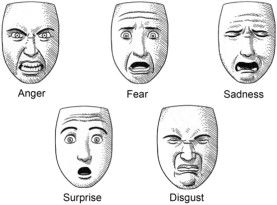Researchers May Have Finally Figured Out The Reason For Our Eyebrows
Language
Reading Level
Listen to Article

The most noticeable difference between the modern human face and that of the hunter-gatherers, who lived on Earth over 200,000 years ago, is the forehead. While we now have flat, smooth foreheads with visible eyebrows, our ancestors sported a pronounced brow ridge. Experts have always believed that the thick rim, and the evolution to the beautiful tufts of facial hair, served a physiological function. Now, a team of scientists from UK’s University of York and Portugal’s Universidade do Algarve suggest the distinct facial features help with our social relationships.

There are currently two widely-accepted hypotheses about the ancient human’s need for the thick brow ridge. One suggests it helped connect the eye sockets to the brain cavities, while the other asserts it was there to protect the skull from the physical stress of chewing, or even a punch to the face.
To verify if either theory was accurate, a team led by Paul O'Higgins created a virtual skull model from the fossilized skull of Kabwe 1, a Homo heidelbergensis an early human species who inhabited Earth between 600,000 and 200,000 years ago.
The University of York anatomy professor said: "We used modeling software to shave back Kabwe's huge brow ridge and found that the heavy brow offered no spatial advantage as it could be greatly reduced without causing a problem. Then we simulated the forces of biting on different teeth and found that very little strain was placed on the brow ridge. When we took the ridge away, there was no effect on the rest of the face when biting.”
With the two popular theories debunked, the team, which published its findings in the journal Nature Ecology & Evolution, has come up with a new argument for the need for the unique facial feature. They suggest it serves a social purpose rather than a mechanical one. The scientists assert that similar to the antlers on a stag, the jutting bow ridge signaled dominance and aggression in our early ancestors. However, as we switched from being hunter-gathers to farmers, our lifestyle changed dramatically, and the need to create more extensive social networks increased.

Thanks to the dietary variety and the lower physical effort required by the agricultural lifestyle, our faces gradually became smaller, causing the jutting bow ridge to transform into a flatter forehead. The need for social communication rather than intimidation started to show in the form of more expressive eyebrows that could facilitate critical social signals in modern humans, like expressions of surprise or anger. According to Penny Spikins, the study's co-author, "Being able to make subtle emotional expressions, and at a distance is likely to have helped in a major social transformation in how unrelated groups of people worked together."
Spanish paleontologist Markus Bastir, who was not part of the study, says that while the theory does open up "exciting prospects for future research," it should be taken with a grain of salt. That’s because Kabwe 1, the specimen used to create the 3-D model, is missing the mandible, or lower jaw. Professor O’Higgins and his team, therefore, had to substitute it with a jawbone from a Neanderthal, which while related, is a different species of the Homo heidelbergensis. Bastir believes that the substitution may have altered the results of the model and bite stresses. Regardless of the real reason for the brow ridge’s evolution, we have all at some point experienced the power of the raised eyebrow!
Resources: mentalfloss.com, york.ac.uk, sciencedaily.com

Get the Workbook for this article!
Workbook contains: Article, Reading Comprehension, Critical Thinking Questions, Vocabulary in Context (+ answers), Multiple Choice Quiz (+ answers), Parts of Speech Quiz (+ answers), Vocabulary Game (+ answers)Cite Article
Learn Keywords in this Article
312 Comments
- Daniel Zhuover 6 yearsomg
- loading...over 6 yearscool!
- Jover 6 yearsI love the skull
- I eat toesover 6 yearsgood.
- Scull hunter over 6 yearsGross but cool
- kjvdj;over 6 yearscool
- muslim girlover 6 yearsI don't really like skulls but this is pretty cool
- unknownover 6 yearscool ♥
- Heartgirlover 6 yearsone of the skulls freaks me out a little
- DinosaurGirlover 6 yearsI like this article, it is very interesting.



